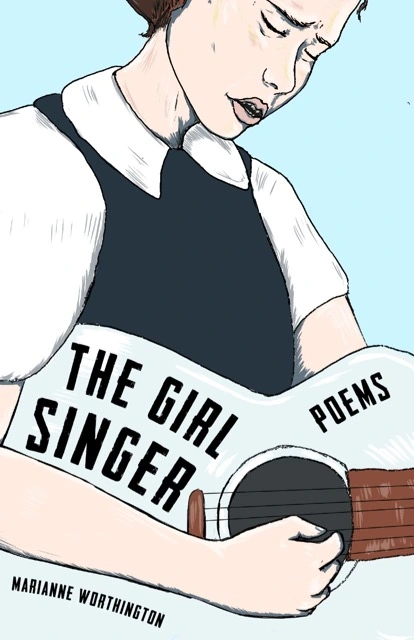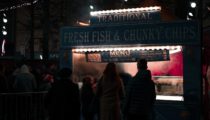Colly was having a pint with Pat in Kavanagh’s after…

In Conversation: Marianne Worthington
As a child growing up in Knoxville, Tennessee, in the 1950s and 1960s, Marianne Worthington was surrounded and subsumed by country music. Her parents often tuned their television set to WATE, the local station that aired Knoxville businessman-turned-mayor Cas Walker’s Farm and Home Hour variety show, which featured established and rising stars including The Everly Brothers, Chet Atkins, Roy Acuff, Carl Smith, Bill Monroe, and perhaps most famously, a talented young girl from Locust Ridge in neighboring Sevier County. Dolly Parton captivated the young Worthington, whose keen musical and poetic ear was already being tuned to a special kind of frequency: the particular blend of power and vulnerability woven into Parton’s songs and those of other female country singers including Loretta Lynn, Patsy Cline, Jeannie Seely, and later, Emmylou Harris.
Worthington’s debut poetry collection The Girl Singer, published in November by Fireside Industries, an imprint of the University Press of Kentucky, pays tribute to these women and others like them, and to the beloved women in her own family. In voices that croon and praise, rage and lament, Worthington has created a moving history that is at once collective and personal. In a recent interview with Appalachian Review editor Jason Kyle Howard, she spoke about the threads of country music, feminism, grief, and nature in her life and work. The interview has been lightly edited for clarity.
■■■
JKH: Three main themes tie this collection together: grief, nature and country music. How and why are these themes connected for you?
MW: Honestly, as I was struggling to put the manuscript together, I wasn’t sure that these themes were connected. Luckily, I had readers and an editor who helped me see they were connected by pointing out how the themes showed up in my work. I could see recurring emphases and emblems, and the poems began to organize themselves around those themes. Outside of the book, grief and nature have been my companions since February 2020. (Isn’t that true for so many of us?) And country music was constantly in my head, like a lullaby, since I was an infant and well up into the late 1980s, anyway.
JKH: Country music history is so deeply woven into many of these poems, and into your own life as well. Many of the artists that appear in the book predate your lived experience of consuming the genre. Have you always been someone who has studied country music and its history?
MW: Yes, I’ve always been interested in the music, stories, and histories of county music. As a kid, I listened to country music because that’s what my parents listened to, and they knew a lot about country music performers, which I picked up just by listening to them talk. Living in Knoxville, my parents had attended the live radio show The Mid-Day Merry-Go-Round. My Mother told me she had seen Maybelle Carter and her daughters at a show. My parents kept up with which musicians were in town for performances. Audiences like my parents had this type of respect, related to pride of place especially, for East Tennesseans who were famous in country music: Chet Akins, Roy Acuff, Carl Smith, Homer & Jethro, Brownie McGhee, and of course, Dolly Parton. My parents loved music and they both were very good singers. In college and graduate school I began to read and study music in a more formal fashion, and I had teachers who encouraged me to write about music.
JKH: What is the history of the term “girl singer”? While you nod in the book to its pejorative roots, you also seem to be trying to reclaim and repurpose the phrase as one of empowerment.
MW: I’m not sure I can relate a history outside of how I know the term to be used; but basically, starting with early barn dance radio, men were always the headliners in country music shows. Women performers would be invited to share the stage with them as their “girl singers.” In the 1960s and 1970s Loretta Lynn was The Wilburn Brothers’s “girl singer.” Dolly Parton was Porter Wagoner’s “girl singer.” “Girl singer” implied a type of ownership, really, as well as an obvious subservience to male performers. Women performers have always understood the label of “girl singer,” and many have fought and are fighting to overcome its connotations. I hope the poems draw attention to rescuing and reclaiming the phrase as one of power.
JKH: A lot of Appalachian women of your mother’s generation may not have used the word feminist to describe themselves, yet they are remembered as such strong women. Would you call this book an intentional act of feminism?
MW: Absolutely, yes. I get so aggravated about how the term “feminism” has become this loaded, ugly word in our language now. Many people, men and women, only see stereotypes when faced with the term. And while there is no one definition of “feminism,” I like to define it as the opportunity for equal self-expression. My grandmothers were without husbands and never remarried. They were very self-sufficient and steady role models of how to be both a working parent and head of the household. Many women performers had this same determination and strength. I saw it in my own family and playing out in front of me on television when I watched women singers in country music. I wanted some of these poems to honor that tenacity for self-expression.
JKH: Who are some of your favorite female country singers? Why do they and their music resonate so deeply with you?
MW: Well, Dolly, of course, because she’s been with me since I was a tiny child. Also, though not country singers, I loved gospel singers like Vestal Goodman and Dottie Rambo. I idolized Mahalia Jackson, whose records I listened to at a cousin’s house. Her voice was so big, and I loved how she broke all the rules of singing, like breathing in the middle of a word. And, truth be told, I was also mesmerized by Jackson’s long-time piano player, Mildred Falls. But really, Emmylou Harris is my very favorite, and not just because of her voice but because she has taught me so much about the history of American music through her recordings. With every album, she honored past musical traditions and stepped forward with new musical innovations. I remember being in the car with my father when we heard her for the first time on the radio singing “If I Could Only Win Your Love.” My father asked, “Who is that singing that old Louvin Brothers song?” And I said, “Who are the Louvin Brothers?” So from the beginning, I had to go find out about Ira and Charlie Louvin as a way to better appreciate what Emmylou was doing in 1975. I wanted to write my master’s thesis on Emmylou Harris but my advisor wouldn’t get on board. I still adore Emmylou.
JKH: Some male country singers—Marty Stuart, for example—show up in the book as well. Why did you decide to include them?
MW: Because like Emmylou Harris, Marty Stuart honors the roots of American and country music. And the poem “I Saw Bobby Bare Kiss Marty Stuart” is a true story and was such a riveting experience that I wanted to write about it as well as try to figure out why I cried through most of that long concert.
JKH: One of the more powerful elements of the collection is how realistically and movingly you examine grief. It’s deeply resonant, but it’s never sentimentalized—yet in writing, reading, revising and re-reading these poems, you are to some degree reliving the illnesses and deaths of your parents. Has that been mostly difficult or healing for you?
MW: Mostly more difficult than healing, I think. I’m glad I could get the poems down—and some of them I drafted in hospitals and nursing homes—but you never stop reliving the illnesses and deaths of your parents. So writing the poems hasn’t been healing, per se, but more like helping me come to some kind of closure. It’s really difficult to write about your beloved dead people and animals without becoming a slobbering fool. I always have to check my tendencies toward sentimentality.
JKH: You write about the natural world with such appreciation and with a keen eye, and I can’t help but wonder how that is connected to your identity as a poet. Would you say that you are an observer of the natural world because you’re a poet, or would you be more likely to say that you’re a poet because of being an observer of the natural world?
MW: I am no good at riddles! I wouldn’t say that I had an “appreciation” of nature as a child, but I was outside all the time as a kid. As long as we came home before dark and my parents had a general idea of where my sister and I were, we roamed the neighborhoods freely. My family and their friends made many picnics and day trips to Norris Lake and other lakes nearby. My mother’s people still lived on a farm that we visited several times a year. We lived at the base of the Great Smoky Mountains National Park. I saw so many bears when I was a kid and waded in many a cold creek in the Smokies. I went to camp every summer. So, I learned a lot about nature by being out in it, and that really never left me.
JKH: You’re a poet who likes to use different literary forms on the page. Sonnets, pantoums, and newer, more experimental forms. What’s the most challenging poetic form for you to write and why?
MW: The contrapuntal (or hinged) poem with two voices, like the poem “A.P. Carter v. Sara Carter,” is quite challenging because the two voices together also have to make a third voice. It’s like working a puzzle. It’s fun, but it is hard to get it right. I love knowing about forms and patterns and reading poems written in form. Poetic forms can be good templates for ironing out your thoughts or for motivating you to write by trying your content out in a particular form. It’s especially fun to break the form/pattern and play around with inventing new “rules” for the form. I admire seeing and learning about new forms. When I was writing “Roll Call” I made up a pattern I wanted to follow: three line-stanzas of eight syllables each and each line ending in the same sound. I wanted that pattern to do the work of describing a particular bird. At first it was just a way to get me started, but I ended up keeping the poems in that shape because they were so much fun to write and I hoped that joy would somehow be conveyed in the form.
JKH: Are you able to pick a poem in the book that you could say you’re most proud of having written?
MW: That’s a hard one. I am pretty happy with the way “On Seeing a Letter Patsy Cline Wrote to Nudie the Tailor” turned out. Originally, the poem included parts of the actual letter Cline had written to the famous rodeo tailor about making her some new clothes. But when it came time to publish the poem in the collection, I could not get permission to use the words of the actual letter from the owner of the letter (despite some really good help from people in Nashville). So I had to take the poem apart and rewrite it. I didn’t think I could do it, and I was ready to just scrap the poem and leave it out of the collection. But then after a good little meltdown, I got to it, and I’m okay with how the poem evolved.
JKH: As we know, the publishing world—and the world-at-large—all too often devalues and ignores women once they exceed a certain age. The Girl Singer is your debut collection, and it’s been released to much buzz and acclaim, even getting a high-profile write-up in the New York Times. Now that the poems are out in the world, how are you feeling?
MW: Old. And happy. And amazed. ■


